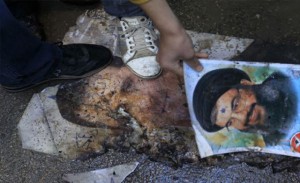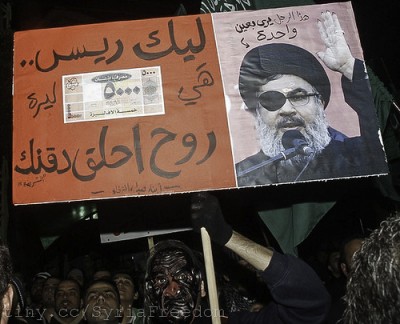
Mazen, a carpenter who organizes protests against President Bashar al-Assad in a suburb of Damascus, Syria, has torn down the posters of Hassan Nasrallah, the leader of Hezbollah, that once decorated his car and shop.
Like many Syrians, Mazen, 35, revered Mr. Nasrallah for his confrontational stance with Israel. He considered Hezbollah, the Lebanese militant group and political party, as an Arab champion of the dispossessed, not just for its Shiite Muslim base but for Sunnis like himself. But now that Hezbollah has stood by Mr. Assad during his deadly yearlong crackdown on the uprising against his rule, Mazen sees Hezbollah as a sectarian party that supports Mr. Assad because his opponents are mainly Sunnis.
“Now, I hate Hezbollah,” he said. “Nasrallah should stand with the people’s revolution if he believes in God.”
Mr. Nasrallah’s decision to maintain his critical alliance with Syria has risked Hezbollah’s standing and its attempts to build pan-Islamic ties in Lebanon and the wider Arab world.
Though Hezbollah’s base in Lebanon remains strong, it runs an increasing risk of finding itself isolated, possibly caught up in a sectarian war between its patron, Iran, the region’s Shiite power, and Saudi Arabia, a protector of Sunni interests in the Middle East. Its longtime ally, Hamas, the Palestinian militant group, has distanced itself from the Assad government, moving its headquarters out of Damascus, and Sunni revolutionaries in Syria have explicitly denounced Hezbollah as an enemy. At home, its Lebanese rivals sense a rare opportunity to erode its power.
In a delicate adjustment in the face of these new realities — and the resilience of the uprising — Hezbollah has shifted its tone. In carefully calibrated speeches last month, Mr. Nasrallah gently but firmly signaled that Mr. Assad could not crush the uprising by force and must lay down arms and seek a political settlement. He implicitly acknowledged the growing moral outrage in the wider Muslim world at the mounting death toll, obliquely noted that the Syrian government was accused of “targeting civilians” and urged Mr. Assad to “present the facts to the people.”
Behind the scenes, Mr. Nasrallah personally tried to start a reconciliation process in Syria early in the uprising and is now renewing those efforts, said Ali Barakeh, a Hamas official involved in the talks.
“He refuses the killing for both sides,” said Mr. Barakeh, the Beirut representative for Hamas.
Mr. Barakeh said that Mr. Nasrallah visited Damascus in April of last year and briefly persuaded Mr. Assad to try to reach a political solution, with Hezbollah and Hamas acting as mediators. But as Hamas began reaching out to fellow Sunni Muslims in the opposition, the plan was scuttled by the Syrian government.
Hezbollah rarely allows official interviews and has refused them for months. But supporters and current and former party activists suggest that the situation is fueling fears of an anti-Shiite backlash and is testing loyalists who must explain the party’s position to others, and themselves.
Mr. Nasrallah is tempering his position because he wants to avoid asking supporters to endure another war, said a former student activist who spends hours defending the party on Facebook, arguing, for example, that rogue forces, not Mr. Assad, are responsible for the “mistakes.”
Mr. Nasrallah “doesn’t want supporters to suffer,” said the woman, who works at a Hezbollah foundation, adding that some still feel “broken inside” from the 2006 war with Israel and “don’t want more pressure.”
Syria’s conflict is testing Hezbollah’s longstanding contradictions. It relies on public support, yet sometimes behaves autocratically; it is a national group founded to fight Israel’s occupation of southern Lebanon, but owes its military might — and the funds that rebuilt the south after the 2006 war — to Iran’s desire to project power; and it styles itself pan-Islamic, but it depends on rock-solid support from Lebanese Shiites for whom it won long-denied power as it became the Middle East’s most formidable militant group and Lebanon’s strongest political force.
Most of all, Hezbollah won respect by sticking to its principles, even among rival sects and the leftist cafe regulars in Beirut who are skeptical of its religious conservatism. Now it is paying a price for its politics of pragmatism in Syria.
To a young, college-educated health care worker who is a lifelong supporter of Hezbollah, the party’s support of Mr. Assad keeps faith with the most important principle of all: opposing Israel.
“This revolution is not made in Syria,” she told friends at a seaside cafe in Sidon, Lebanon, after shopping at a shiny new mall. “The real target is Lebanon and the resistance.”
Echoing the party line, she said that the United States and its Arab allies fomented Syria’s revolt to punish Hezbollah for fighting the Israelis in 2006.
But that argument has frayed. Hamas, unable to disown Syria’s Sunni revolutionaries, declared itself neutral, angering Mr. Assad, and then moved its leadership from Damascus. Some Hamas leaders from Gaza went further, praising the Syrian revolution to crowds that shout, “No, no, Hezbollah.”
Deprived of Hamas’s political cover, Hezbollah has been accused of sectarian hatred, and has been its target as well. Syrian rebels have burned the Hezbollah flag, claimed that its snipers are killing civilians in Syria, and named their brigades after historic warriors who defeated Shiites in Islam’s early schismatic battles. Early on, some analysts thought that if a Sunni government would arise in Damascus it might support Hezbollah against Israel. But now, says Michael Wahid Hanna of the Century Foundation, Hezbollah may have missed a chance to hedge its bets.
Hezbollah’s supporters, none of whom wished to be identified because the party discourages interviews with reporters, framed their fears in sectarian terms. One worried that if Sunnis came to power in Syria, they would bar Shiites access to shrines there and in Iraq, as prophesied in a Shiite text. Another supporter thought Sunni extremists might bomb Hezbollah areas.
Hezbollah seems in no danger of losing its most hard-core supporters. But some of its loyalists have questions.
n the Sidon cafe, the health worker declared that Syrians, with free education and medical care, had no reason to rebel. Her friend, a Shiite from Hezbollah’s heartland in southern Lebanon, disagreed. “They have things,” she said, “but they are fighting for their rights.”

A supporter in the Dahiya, Hezbollah’s Beirut stronghold, said that Al Jazeera, the television news network, was faking atrocities and blaming the government for them. A friend mocked him: Mr. Assad’s fall would be bad for Shiites, he said, but he is “slaughtering his people.”
A Hezbollah party member said that government shelling had killed many civilians, but it was justified because the victims had let the rebels use their houses “as bunkers.” Israel used a similar argument, which Hezbollah condemned, to defend its bombing of Hezbollah neighborhoods in 2006.
Mr. Barakeh of Hamas suggested that Hezbollah’s leaders, who prize their reputations for morality, were troubled by the “killing of innocents” on both sides and knew that the government was not blameless. “They are aware,” he said.
He said he spoke with Mr. Nasrallah for five hours on March 9, telling him that neither side could win by force. On March 14, Hezbollah again blessed Hamas’s efforts to engage the opposition through its contacts in the Muslim Brotherhood, the pro-Hezbollah newspaper Assafir reported.
The next day, as Mr. Assad insisted that the rebels stop shooting first, Mr. Nasrallah called on all Syrians — “people, regime, state, army” — to lay down their arms “simultaneously.”
He later called for “serious and genuine” reforms. Citing religious, “pan-Arab and moral considerations,” he said a political solution was the duty of all “whose hearts are throbbing with sympathy for the Syrian people — men, women, children and elderly.” It was a dig at Saudi Arabia for trying to arm the rebels, but also nodded at regional anguish over the killing.
Even for Hezbollah loyalists who call Syria’s revolt foreign-inspired, the idea of revolution has a natural resonance.
“Arab people need to wake up,” the former student activist said at her office. “How do you spend your day, Arab guy? Watching Lady Gaga. Smoking argileh,” the traditional water pipe.
She fantasized about a “clean and pure” revolution in the Arab world. “If it was real, if it was really the people’s will,” she said, “it wouldn’t just be good, it would be great.”
Photo: Syrian protesters step on a poster of Syrian President Basahr al-Assad and Lebanon’s Hezbollah leader Sayyed Hassan Nasrallah during a protest against Syrian President Bashar al-Assad in Saqba, Syria on Jan. 27, 2012.
NY Times

Leave a Reply
You must be logged in to post a comment.